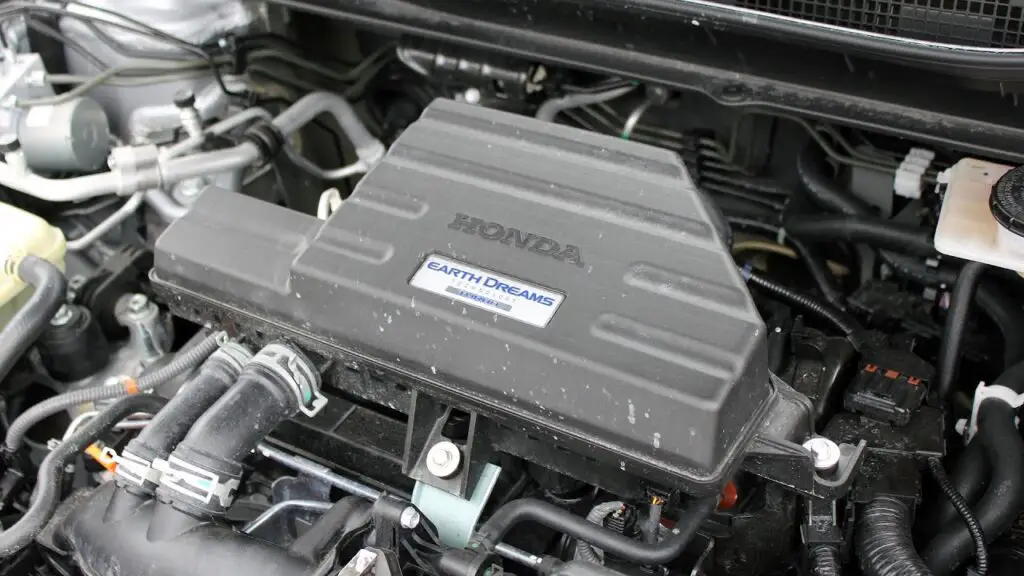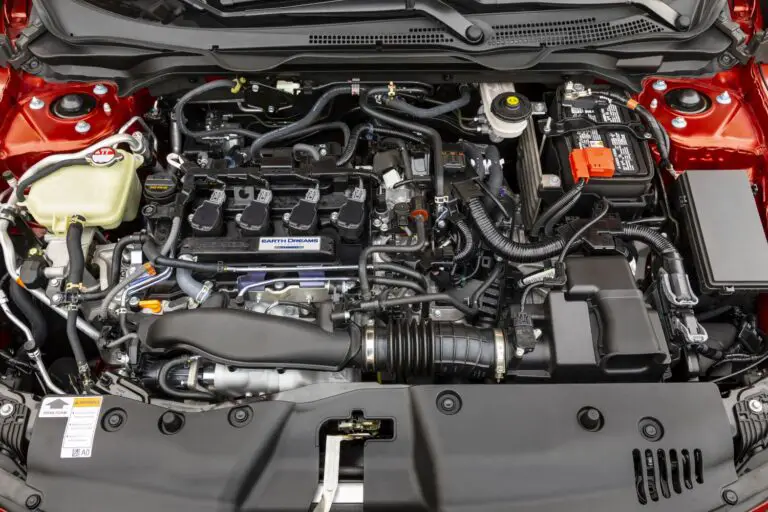Honda 1.5 Turbo engine problems are often related to issues like oil dilution, carbon buildup, and turbocharger performance. These problems can lead to decreased engine efficiency, rough idling, or power loss.
The Honda 1.5 Turbo engine is part of Honda’s L15B series and has become a popular engine choice for many of the brand’s models, including the Civic, CR-V, and Accord. Known for its fuel efficiency and solid performance, this turbocharged engine has earned praise for offering an impressive balance between power and economy. However, like all engines, the 1.5 Turbo has its own set of challenges.
Over the years, several issues have been reported by owners, particularly related to oil dilution, carbon buildup, and turbocharger-related concerns. While Honda has made efforts to address these problems through recalls and technical service bulletins, it’s essential for owners to be aware of these potential issues to avoid costly repairs down the line.
In this article we have discussed the most common problems associated with the Honda 1.5 Turbo engine, what causes them, and how you can resolve or prevent them.

Contents
Common Problems with the Honda 1.5 Turbo Engine
While the Honda 1.5 Turbo engine is known for its performance and fuel efficiency, there are several issues that owners have reported over time. The most common problems that may affect this engine and how they impact vehicle performance are below –
1. Oil Dilution Issues
One of the most widely discussed issues with the Honda 1.5 Turbo engine is oil dilution. This occurs when fuel enters the engine oil, mixing with it and reducing the oil’s effectiveness. Oil dilution can lead to premature engine wear, reduced lubrication, and even engine failure if left unchecked.
Causes of Oil Dilution
- Cold Starts and Short Trips: When the engine is running cold, especially during short trips, it doesn’t have enough time to reach its optimal operating temperature. This incomplete combustion can cause fuel to bypass the piston rings and mix with the engine oil.
- Direct Fuel Injection: The 1.5 Turbo engine uses direct fuel injection, which can lead to more fuel entering the oil than in traditional engines.
Solutions and Preventive Measures
- Frequent Oil Changes: One of the simplest and most effective solutions to oil dilution is changing the oil more frequently than the manufacturer recommends. Some owners have opted for oil changes every 3,000-5,000 miles instead of the recommended 7,500 miles.
- Avoid Short Trips: Try to avoid short trips where the engine doesn’t have time to warm up completely. If possible, drive for longer distances to ensure the engine reaches operating temperature and burns off any excess fuel.
- Software Updates: Honda has issued software updates to optimize engine performance and minimize oil dilution. It’s important to ensure that your vehicle has the latest software updates.
2. Carbon Buildup on Intake Valves
Another common issue with the Honda 1.5 Turbo engine is carbon buildup on the intake valves. This is a frequent problem in vehicles with direct injection engines, like the 1.5 Turbo, because direct injection skips the process of cleaning the intake valves with fuel, which happens in traditional engines.
Causes of Carbon Buildup
- Direct Fuel Injection: Since direct injection engines do not have fuel washing over the intake valves, carbon deposits accumulate over time.
- Engine Design: In the Honda 1.5 Turbo engine, the carbon buildup can cause rough idling, poor fuel efficiency, and decreased performance.
Solutions and Preventive Measures
- Fuel System Cleaners: Periodic use of fuel system cleaners can help reduce carbon buildup. However, it’s important to note that this is a short-term solution.
- Manual Cleaning: In more severe cases, carbon buildup can only be removed manually. This involves cleaning the intake valves, a task best left to professionals.
- Regular Maintenance: Regular maintenance and inspections can help detect early signs of carbon buildup before it becomes problematic.
3. Turbocharger Issues
The turbocharger in the Honda 1.5 Turbo engine is responsible for increasing the engine’s power output without compromising fuel efficiency. However, some owners have reported turbo-related issues, including poor performance and unusual noises.
Causes of Turbocharger Problems
- Oil Contamination: Since oil dilution affects engine oil quality, it can lead to inadequate lubrication for the turbocharger, causing it to wear out prematurely.
- Excessive Heat: The high temperatures generated by the turbocharger can lead to overheating and damage over time if the oil isn’t changed regularly.
Solutions and Preventive Measures
- Regular Oil Changes: Regular oil changes with high-quality oil can help protect the turbocharger from premature wear.
- Monitoring Oil Levels: Always ensure the oil levels are maintained properly, as low oil levels can exacerbate turbocharger issues.
4. VTC Actuator Noise
Many owners of the Honda 1.5 Turbo engine have reported hearing a rattling noise during cold starts, often attributed to the Variable Timing Control (VTC) actuator. While this noise is typically brief, it can be concerning, and many drivers wonder whether it’s a serious issue.
Causes of VTC Actuator Noise
- Oil Dilution: Low-quality or diluted oil may not lubricate the VTC actuator properly, leading to the rattling noise.
- Cold Starts: The noise often occurs during cold starts when the engine oil has not yet reached its optimal operating temperature.
Solutions and Preventive Measures
- Use High-Quality Oil: Ensuring that you use high-quality oil can reduce the likelihood of this issue.
- Frequent Oil Changes: Changing the oil more frequently can prevent the oil from becoming diluted and ensure proper lubrication of the VTC actuator.
5. Head Gasket Failures
Head gasket failures are rare but have been reported in some Honda 1.5 Turbo engines. This issue can cause coolant to mix with the engine oil, leading to engine overheating and potential damage.
Causes of Head Gasket Failures
- Overheating: Extended periods of engine overheating can compromise the integrity of the head gasket, leading to leaks and failure.
- Oil Contamination: As mentioned, oil dilution can increase the likelihood of head gasket failure by causing excessive heat buildup.
Solutions and Preventive Measures
- Cooling System Maintenance: Regularly check and maintain the cooling system to prevent overheating and ensure the engine stays within safe temperature ranges.
- Address Oil Dilution: Addressing oil dilution through frequent oil changes and proper driving habits can prevent head gasket issues.

How to Maintain the Honda 1.5 Turbo Engine
To keep the Honda 1.5 Turbo engine running smoothly and avoid the problems mentioned above, consider the following maintenance tips:
- Regular Oil Changes: Change the oil more frequently than the manufacturer recommends, especially if you frequently drive short distances or in cold weather.
- Use the Correct Oil: Always use the oil recommended by Honda, as it is formulated to meet the specific requirements of the 1.5 Turbo engine.
- Monitor Oil Levels: Regularly check oil levels and quality to detect any issues early.
- Drive for Longer Distances: Avoid short trips and allow the engine to fully warm up during every drive.
- Follow Honda’s Maintenance Schedule: Stick to the recommended maintenance schedule for your vehicle to ensure all parts are functioning optimally.
Frequently Asked Questions
Here are some FAQs about Honda 1.5 turbo engine problems –
1. How often should I change the oil in my Honda 1.5 Turbo engine?
It’s recommended to change the oil every 3,000 to 5,000 miles, especially if you drive short distances or in cold weather.
2. Can I use any oil for my Honda 1.5 Turbo engine?
No, it’s essential to use the oil recommended by Honda to ensure optimal performance and protect the engine.
3. How can I prevent carbon buildup in my Honda 1.5 Turbo engine?
Regular maintenance, such as fuel system cleaning and using quality fuel, can help reduce carbon buildup.
4. Is oil dilution common in the Honda 1.5 Turbo engine?
Yes, oil dilution is a known issue in some Honda 1.5 Turbo engines, especially with short trips and cold starts.
5. Can I repair turbocharger issues on my own?
It’s recommended to seek professional help for turbocharger issues, as repairs can be complex and require specialized tools.
Conclusion
The Honda 1.5 Turbo engine is an excellent option for those seeking a blend of power, fuel efficiency, and performance. However, like any engine, it does come with its own set of challenges. Common problems like oil dilution, carbon buildup, turbocharger issues, and VTC actuator noise can be mitigated with proper maintenance and care.